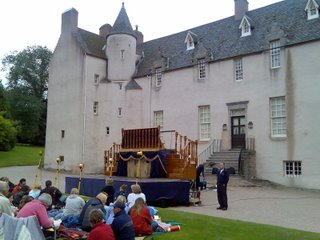Sunday, July 09, 2006

Five Players and the Scottish Play – July 9, 2006
Shakespeare’s Macbeth is the story of a man seduced by witches, and his sexual wife, to murder his uncle so as to become king. He subsequently bumped off other noblemen who interfered with his ambition. Getting to the top is as difficult as staying there. Not only is the play replete with hallucinations, magic and madness but the play has a curse on it, which prevents actors and directors preparing it from uttering the play’s name. Safely, they refer to it as the Scottish Play.
So Amber and I sat on Drum Castle’s lawn yesterday evening and watched five actors defy all the curses to perform the entire play. The men and women switched in and out of roles not fussy whether Donald Bane, Macduff or the witches were male or female. At times they engaged in self parody as they belted out their lines. The Porter strung out his scene to twenty minutes while he wandered among the audience and engaged their help. When the inevitable clouds gathered over us and let loose a summer sprinkle, a few umbrellas went up but no one left. The rain moved on but a bitter wind turned our feet and hands to ice. Amber and I huddled on our blanket. Hadn’t we left Texas to get away from the heat? We were glad for the half-time cup of hot tea, then watched as Birnam wood marched to Dunsinane castle. There was still plenty of daylight for the final curtain at 10.30.
Macbeth has to be the most difficult of any Shakespeare’s play. I’ve walked out of a couple of productions too painful to watch. But this one felt fresh and vibrant, with an infectious enthusiasm.
He’s a most un-modern hero. Not an Indiana Jones or a Ted Bundy who kills without any remorse – the sort of guy people like to read about, but a man tormented by conscience, pursued by nightmares and visions. Though Lady Macbeth professes that a little water washes the blood from her hands, we later see a woman who washes her hands in her sleep and wonders that “the old man had so much blood.” But every Shakespearean murderer is racked by a guilt that prevents him from enjoying his subsequent life. Hamlet doesn’t have it in him to even kill his uncle. Claudius kneels to pray to assuage his guilt pangs. The ghost of Caesar haunts Brutus for the final two acts. Were murderers haunted by their nefarious actions more fashionable in Elizabethan times? Was this Shakespeare’s way of telling us that “crime doesn’t pay?” Or was Shakespeare himself ridden by guilt which he projected onto his characters?
I suspect the latter. We know nothing about who wrote the plays, so they have to speak for themselves. Killers in today’s news rarely display much remorse, even the day of their execution. In our “can do” culture guilt is not only unfashionable but unmanly. Please – let’s not have any “to be or not to be.” Shakespeare wrote in the shadow of the Reformation. His characters seem ridden with the Catholic doubt and guilt that had to be prevalent in England. Hadn’t the Pope declared that all Anglicans were damned to everlasting fire? In response, Henry VIII offerered the chopping block to anyone within his reach who naysaid his claim to be the head of the church, or questioned the validity of his divorces. As he heads off to murder Duncan, Macbeth captures the spirit of those times as he says – “That bell is a knell that summons your soul, Duncan, to heaven or to hell.”
The plot is blatantly unhistorical. Macbeth was a good king with a better claim on the throne than Duncan, a nasty man whom he killed not by knifing him in his sleep, but fairly in battle. His Norwegian wife, Gruagh had to be very loving and supportive. Under Macbeth, Scotland was at peace for twelve years. Enough time that Macbeth undertook a journey to Rome to ask for the Pope’s absolution for killing his uncle. Birnam wood would have a ways walk to Dunsinane – a tramp of 30 miles. Shakespeare was less fussy about geography than about history. But does the real story make the Scottish Play less interesting?
I submit that the play is much more English than Scottish. Despite its Scottish theme, psychologically the play deals more with England and needs to be understood in its Elizabethan context.
For more Scottish material, try the writings of Robert Burns, two centuries later, Sir Walter Scott or Robert Louis Stevenson. About whom, later.
Comments:
<< Home
Enjoyed your thoughts on the Scottish (/Elizabethan) Play.
Speaking of modern killers, have just finished American Psycho. Incredibly graphic in parts, but an important novel. Much to think about ... In many ways Pat Bateman is the personification of the system/society he's a part of.
Writing this from an internet cafe in Bariloche, Patagonia, where it has no vaguely stopped raining, so I shall be on my way. See jinete-palido.livejournal.com for the in-depth story.
Love to you both, and welcome to Bonnie Scotland!
Adam
Post a Comment
Speaking of modern killers, have just finished American Psycho. Incredibly graphic in parts, but an important novel. Much to think about ... In many ways Pat Bateman is the personification of the system/society he's a part of.
Writing this from an internet cafe in Bariloche, Patagonia, where it has no vaguely stopped raining, so I shall be on my way. See jinete-palido.livejournal.com for the in-depth story.
Love to you both, and welcome to Bonnie Scotland!
Adam
<< Home
